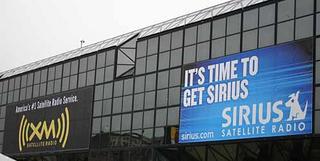Satellite Radio Companies Face Suit Upon Releasing Devices that Copy Music

XM & Sirius, the satellite radio companies, are reportedly to release new devices that allow the copying of the songs coming through the devices. To no one's surprise the RIAA is threatening suit for copyright infringement, presumably under the "inducement" to infringe bits of the Grokster opinion. If a suit actually progresses through the court system it would be an interesting battle that could force the courts to determine a more clear vision of what the language on the Grokster opinion meant and will again push against the old Sony-Betamax "non-infringing uses" doctrine.
The courts will have to consider whether digital music via satellite radio is truly different than music that arrives via the regular radio. Both can be copied very easily, but only one sounds digital. Regular radio is obviously covered by the non-infringing uses doctrine, but is digital radio? Will the digital radio just be viewed as an internet device or as a broadcast device like a regular radio? Any determination will probably rely very much on the exact specifications of these devices, there would be questions such as -- do they allow the copied music to be moved off of the device and on to a computer or CD, etc. Here's a snippet from the article:
Slyck News -- RIAA Takes On XM Over Copyright Infringement
In late July, XM announced a partnership with Samsung to produce a portable device that allows users to record songs from satellite radio broadcasts and then catalog and save favored songs while deleting others.
Sirius later announced a similar device, called the S50. The device will be about the size of an iPod and released in October.
The music industry argues the recording capability — essentially Tivo for radio — is a clear copyright violation and could take revenue away from paid download music stores, such as iTunes. One executive argued the devices give users "permanent ownership of copyrighted material without paying for it."
XM has a deal with the paid service Napster, which allows user to click and buy songs they hear on satellite radio broadcasts. The deal was welcomed by the industry, yet raises the question, one music executive said, "Why would anyone use the Napster platform to buy it if XM is giving it away for free?"
Some record executives expect an ugly battle if XM and Sirius don't modify the devices.
"They can't do this without being sued," said another music executive involved in the discussions.
The rupture over the portable devices comes as the music industry is gearing up to demand higher licensing fees from the satellite radio industry once the current seven-year contract expires at the end of the year.





 <
?
law blogs
#
>
<
?
law blogs
#
>

2 Comments:
I don't think that XM and Sirius are actually doing anything patently illegal. Fair use allows you to record basically any broadcast as long as its for personal use, and record companies will have a hard time proving that this device actively encourages illegal file sharing.
There may be some difficulty proving inducement to infringe here, but that's basically what I said -- a case here would force the courts to determine exactly what constitutes "inducement." Including a record button and advertising the feature may or may not be enough.
Also, you used the term "broadcast," but as I mentioned above there is an issue regarding whether satellite radio is in fact a braodcast or whether it is more akin to a computer because the incoming data is a digital stream. Basically, a court will have to determine if the higher quality of a digital "broadcast" warrants treating satellite radio as different from traditional radio.
The ability to record traditional radio never threated the market for purchasing music because the sound quality was so low. Satellite radio streams that can be so easily recorded may actually threaten the music industy's business model.
Clearly, traditional radio & Tivo & satellite radio is protected by the 'substantial noninfringing uses' Sony-Betamax copyright doctrine. However, that doctrine is being chipped away at now due to new digital technology and it's ability to copy media so easily & the fact that it now greatly threatens major business interests.
Like I said above, a case here will depends on teh facts -- another question would be: "how high is the quality of the satelite radio b-cast? Is it good enough to replace the need to buy the music?"
I don't see how the new XM/Sirius devices are much different than Tivo. But I'm no expert on satellite radio either.
One thing I'm sure of though -- the music industry is going to jack up the costs of licensing music to satellite radio companies big time, especially if they think those companies are trying to give away their music to consumers thus killing off CD/iTunes type sales.
Post a Comment
<< Home